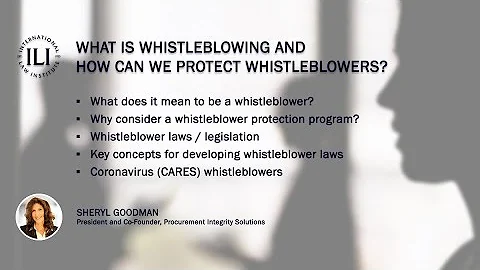
Whistle blower is a borrowed word, originating from the British police's action of blowing the whistle when they discover a criminal case to attract the attention of their colleagues and the public. It was later used in the United States to refer to a whistleblower.
What we currently refer to as a "whistleblower" is a person who draws the public's attention to the shortcomings of a government or enterprise in order to take some corrective action. Generally speaking, malpractice or misconduct refers to a violation of laws, rules or regulations that directly threatens the public interest, such as fraud and corruption.
report refers to reporting and reporting. Quotes from Huang Liuhong's "Fu Hui Quanshu·Education·Li Qi De" of the Qing Dynasty: "Choose a native who is over eighty years old, has good moral character, and reports the truth to the public." In modern Chinese, reporting is a sensitive word, which has the effect of being passionate. The bright side of righteousness is often accompanied by the dark side of human nature such as jealousy, revenge, blackmail, and vanity.
In various cultures, terms such as "insider" or "whistleblower" will convey negative impressions. For this reason, American civil rights activist Ralph Nader proposed the term "whistleblower" in the 1970s. The term whistleblower conveys the positive attitude of standing up for social justice. The image has been used to this day.
In the United States, legislation related to rewarding and protecting whistleblowers is also known as the "Whistleblower Act." In 2008, the Dodd-Frank Plan amended the Securities Exchange Act of 1934 and added Section 21f "Securities Whistleblower Incentives and Protections." Mysterious insider revelations have a deterrent effect, just like blowing a whistle at a crime scene, which can help significantly reduce administrative inspection costs and curb violations.
But the most critical part of the American whistleblower system is not the Whistleblower Protection Act, but the False Claims Act. The purpose of this bill is to deal with individuals or businesses that obtain illegitimate income from the government through fraudulent means or evade paying taxes and fees. For example, some government officials engage in malpractice, lie and inflate expenses, or companies evade taxes. At the same time, this bill has a "sharer clause" (qui tam) that also encourages third parties ("relators") to make whistleblowers and report illegal actors. If the third party’s report is found to be true, the person can receive a government fine of 15%-20% as a reward for reporting. The
whistleblower program has three pillars: protection, confidentiality, and rewards. Pursuant to Section 21f, SEC will provide monetary rewards to qualified whistleblowers who voluntarily provide first-hand information, promote successful enforcement actions/related litigation, and ultimately generate fines in excess of $1 million. The reward amount is equivalent to 10% to 30% of the monetary penalty amount.
To ensure that whistleblower rewards do not reduce compensation for victims of securities violations, Congress established a separate fund called the Investor Protection Fund. Rewards for qualified whistleblowers will be paid out of the Investor Protection Fund. The SEC Commission has established an Office (OWB) under the Enforcement Division to implement the whistleblower program.
Of course, the whistleblower scheme aims to supplement, not replace, the existing corporate compliance regulatory framework. For those who report violations, the Whistleblower Program also encourages them to play a role within the company's existing compliance framework where possible.
It can be seen that the whistleblower system itself plays an important role in combating favoritism, fraud and underreporting of taxes. In recent years, some domestic scholars have advocated learning from whistleblowers in the United States and applying them to my country's food safety field, encouraging employees within companies to use the same method to report. Due to the lack of a public interest litigation system, it can only be carried out through ex-post incentives from the government. However, due to the lack of relevant whistleblower protection measures, many reward methods are ineffective. At the same time, whistleblowers are retaliated from time to time.
Under the overall layout of enriching law enforcement methods, the Chinese version of the whistleblower program has also been announced. On June 27, 2014, the China Securities Regulatory Commission held a press conference and issued the "Interim Provisions on Reporting of Violations and Violations in Securities and Futures", turning the long-standing system of reporting violations in practice into a regulatory tool.The main content is as follows:
Ø Encourage real-name reporting - Encourage whistleblowers to report with real-name names. If the reporter provides his or her real name, ID number, valid contact number and other identity information when reporting, it is a real-name report.
Ø Keep the reporting information confidential - implement coding and management of the whistleblower's name, ID number, contact information, work unit, address and other identity information, and use coding in all stages such as investigation, punishment and reporting reward review.
Ø Reward arrangement - if the reporting facts are clear, the clues are clear, and the investigation is true, and administrative penalties have been imposed in accordance with the law and the amount of fines and confiscations is more than 100,000 yuan, the whistleblower will be rewarded with 1% of the fines and confiscations; the whistleblower has been transferred to the judicial authority in accordance with the law. If an effective guilty verdict is subsequently made, rewards will be given as appropriate. The amount of the award shall not exceed 100,000 yuan. For clues about cases that have a major impact across the country or involve a huge amount of money, and are found to be true upon investigation, the amount of the reward will not be limited by the provisions of the preceding paragraph, but will not exceed a maximum of 300,000 yuan.
Ø Legal Responsibilities - Whistleblowers are not allowed to fabricate facts, falsify evidence, defraud reporting rewards or make false accusations to frame others. Those who use reports to defraud reporting rewards or make false accusations to frame others will bear legal responsibility in accordance with the law.
proposed the goal of reform, which requires the confidence of law enforcement. From 2013 to 2016, regulatory agencies allocated their greatest energy to improving the administrative law enforcement system and promoting regulatory transformation. Among them, reporting of securities and futures violations is a powerful tool innovation.
believes that after this "war epidemic", my country's "whistleblower" legal system will be taken seriously and improved. As the "whistleblower" of the epidemic, Dr. Li Wenliang will always be remembered by us.





















